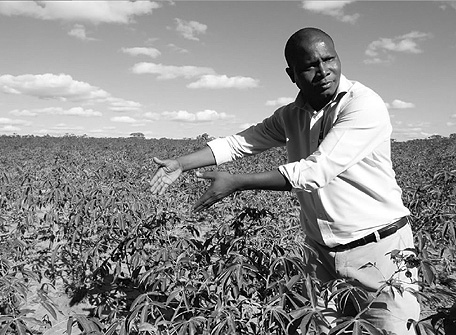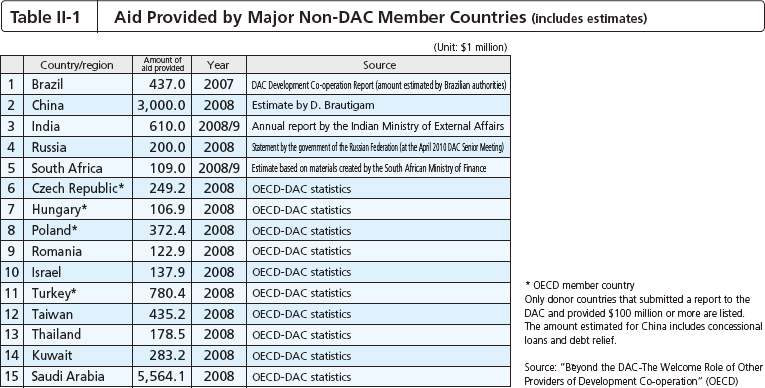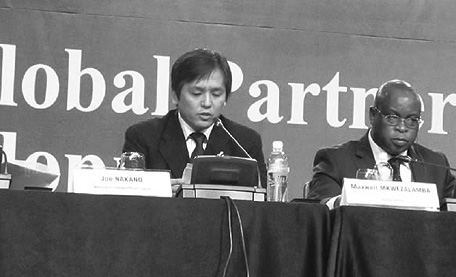Japan's Official Development Assistance White Paper 2011
Part II A New Viewpoint on Aid
Chapter 1 New Partnerships

A laboratory staff member shows cassava that is under test cultivation at an agricultural experiment station for the "Project for Improving Research Capacity for Nacala Corridor Agriculture Development" in Mozambique. Japan and Brazil have teamed together to provide support for agricultural development in Mozambique, with the aim of transferring Brazil's agricultural technology, knowledge, and experience to the countries of Africa. (Photo: Mika Tanimoto/JICA)
Section 1 ODA and the Rise of Emerging Countries
In recent years, the impact of countries referred to as "emerging donors" has become increasingly significant. These emerging donors include China, India, Brazil, and other countries that have achieved rapid economic growth, and are implementing aid programs as "South-South cooperation" (cooperation between developing countries; see page 26), focused on infrastructure and other economic areas, the Czech Republic, Poland, Hungary, and other countries that, upon joining the EU, have become providers of ODA, middle and eastern European countries that have been proactively participating in the OECD's (Note 1) Development Assistance Committee (DAC), and Saudi Arabia, Kuwait, the United Arab Emirates, and other Arab countries that utilize plentiful income from oil to provide aid. The types of aid are diverse.
The rise of emerging donors has also significantly altered the configuration of development funds. The DAC has estimated that these emerging donors provided as much as $12 billion to $14 billion in aid in 2008. This amount corresponds to 9% to 10% of the total amount of ODA provided by DAC member countries that same year. In addition, some emerging donors, such as Saudi Arabia, provided aid on a scale larger even than many DAC member countries.

If the number of countries involved in development, particularly emerging donors, increases, countries receiving aid will have more options for development funding and assistance, and those options will be more diverse. The entire international community should welcome this in order to encourage development. Just as Japan has the experience of changing from an aid-receiving country to an aid-giving country, many emerging donors also have the history and experience of development in their own countries, and are proactive in utilizing them in the assistance that they provide.
At the same time, it is important that the assistance provided by emerging donors is not conducted according to a method unique to that donor, but rather that it adheres to the procedures and rules, etc., of aid that has been provided by the international community in the past, in order to avoid placement of an excessive burden on the developing countries that receives the aid. To accomplish this, it is necessary to cooperate with the emerging donors. It is crucial to the development of developing countries for traditional donors and emerging donors to share their knowledge and experience as they cooperate to provide assistance. In the future, it will be necessary to create broad cooperative relationships that include emerging donors, civil society, private businesses, and other diverse actors that are involved in providing aid for development, in order to achieve the Millennium Development Goals (MDGs) and other goals shared by the international community.
Currently, the promotion of cooperation with emerging donors is being discussed at a variety of international forum. The Seoul Development Consensus for Shared Growth and the Multi-year Action Plan on Development were formulated at the November 2010 G20 Summit in Seoul attended by representatives from China, India, Brazil, Saudi Arabia, and other emerging donors. In addition, the DAC Statement on "Welcoming New Partnerships in International Development Co-operation" was adopted at the DAC Senior Level Meeting in April 2011. The Fourth High Level Forum on Aid Effectiveness was held in Busan, South Korea in November 2011. The participation at the Forum of emerging donors in a new cooperative framework was a significant step forward in efforts toward shared benefit to the international community and addressing issues on a global scale. In the future, it will be important to cooperate with emerging countries as well to steadily implement the commitments of the agreement made in Busan. (See page 144 for details regarding Aid Effectiveness.)

Parliamentary Vice–Minister for Foreign Affairs Joe Nakano attends the Fourth High Level Forum on Aid Effectiveness in Busan, South Korea (November 2011)
Notes:
(1) OECD: Organization for Economic Co-operation and Development
